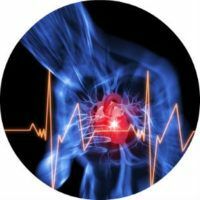
Adrenoblockers or adrenolytics are a group of medications that cause a blockade of receptors to noradrenaline and epinephrine. They are used in cardiology and general therapy for the treatment of patients with heart and vascular lesions. Every year the list of products is replenished, but only a qualified doctor can determine which of them should be taken with a particular pathology.
- Mechanism of action
- List of
- Alpha-1-blockers( selective)
- Dalfaz( Alfuzosin, Dalfaz Retard, Alfuprost MR)
- Doxazosin( Doxazosin-FPO, Camyrin CL, Camiren, Cardura, Magurol, Doxazapstan, Zoxon)
- (Adverzuten, Polipressin, Prazozinbene, Minipress)
- Terazosin( Therazosin-Teva, Setegis, Kornam)
- Tamsulosin( Omnik, Fokusin, Omsulosin, Proflosin)
- Urapidil Karino( Ebrantil, Tahiben)
- Urerek
- Alpha-2 adrenoblockers( nonselective)
- Dopegit( Meti(Ditamin, Clavigrenin, DG-Ergotamine)
- Diohydroergotoxin( Hydergin, DG-Ergotoxin)
- Sermion( Nicergoline, Nicergoline-Nitergolin,
- )
- Clonidine( Catapresane, Clopheline, Barklid, Chlophazolin)
- Alfa-1,2- adrenoblockers
- DihydroergotamineFerein)
- Beta-1-adrenoblockers( selective, cardioselective)
- Bisoprolol( Concor, Concor Cor, Coronale, Niperten)
- Brevyblock
- Metoprolol( Egilok, Betaloc, Metocard, Metoprolol Retard-Acrychin)
- Beta-1,2-adrenoblockersnonselective)
- Anaprilin( Obsidan)
- bopindolol( Sandonorm)
- nadolol( Solgol, Betadol)
- oxprenolol( Trazikor)
- Alpha-beta-blockers
- Carvedilol( Dilatrend, Carvedilol Sandoz, Carvedilol Zentiva, Vedikardol)
- Proksodolol
- during pregnancy
- Children
action mechanism in many diseasesthere is a need for blockade of adrenergic impulses to eliminate the effects of noradrenaline and epinephrine. To this end, adrenoblockers are used, the mechanism of action of which is blockade of adrenoreceptors( protein molecules to noradrenaline and adrenaline), while the process of producing hormones themselves is not violated.
There are 4 types of adrenoreceptors in the vascular walls and the heart muscle - alpha-1, alpha-2, beta-1 and beta-2.Adrenolytics are able to selectively turn off receptors, for example, only alpha-1 or beta-2 and so on. As a result, adrenoblock drugs are divided into several groups, depending on which adrenoreceptors they turn off.
List of
to table of contents ^Alpha-1-adrenoblockers( selective)
Helps reduce arterial tone, which leads to their dilating and decreasing pressure in the bloodstream. In addition, the drugs are used in the complex treatment of prostatitis in men.
to contents ^Dalfaz( Alfuzosin, Dalfaz Retard, Alfuprost MP)
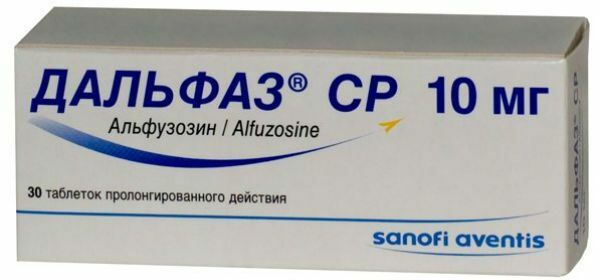
Is available in the form of tablets;active ingredient is alfuzosin hydrochloride.
The blocker of alpha-1-adrenoreceptors( mainly in the prostate and urethra).Helps reduce pressure in the urethra and decreases the resistance of urine flow, helps to relieve urination and eliminate dysuria, in particular, with prostatic hyperplasia. In the therapeutic dosage does not affect the alpha-1-adrenoreceptors of blood vessels. It is used for the therapy of functional signs of benign prostatic hyperplasia.
Inside is taken 5 milligrams twice a day, it is recommended to begin therapy with an evening reception. The daily dose should not exceed 10 milligrams. Elderly people and patients receiving antihypertensive treatment are prescribed at 5 milligrams per day in the evening, if necessary, the daily dose is adjusted to 10 milligrams.
Side effects: nausea, dry mouth, headache, tachycardia, dizziness, drowsiness, allergic reactions( skin rashes, itching), swelling, tinnitus.
Doxazosin( Doxazosin-FPO, Camirin CL, Camiren, Cardura, Magurol, Doxazprostan, Zoxon)
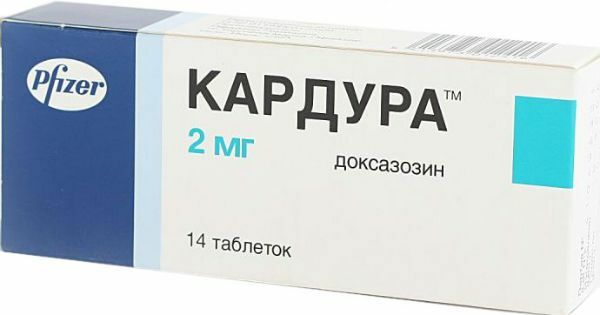
Is available in the form of tablets;the active ingredient is doxazosin.
Reduces blood pressure without development of tachycardia, increases the coefficient of good cholesterol and reduces the total content of TG and cholesterol. The drug is effective in arterial hypertension, including, accompanied by metabolic disorders( hyperlipidemia, obesity).
Tablets can be taken in the morning or in the evening without chewing. The initial dose is 1 milligram per day. After 7-14 days, depending on the patient's condition, the dose can be increased to 2 milligrams per day, then after 7-14 days - up to 4 milligrams, 8 milligrams or 16 milligrams a day to achieve the necessary therapeutic effect.
Side effects: fainting, arrhythmia, tachycardia, nausea, fatigue, headache, drowsiness, irritability, asthenia, rhinitis.
Prazozin( Adversuthin, Polypressin, Prazosinbene, Minipress)
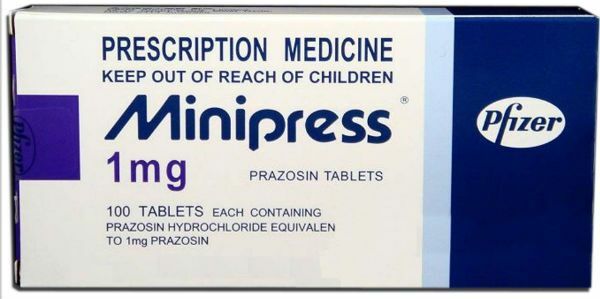
Produced in the form of tablets;active ingredient is prazosin.
The peripheral blocker of postsynaptic alpha-1-adrenergic receptors interferes with the vasoconstrictive effect of catecholamines, reduces blood pressure and reduces afterload on the heart muscle. Indications for use are arterial hypertension, Raynaud's disease and syndrome, chronic heart failure, spasm of peripheral vessels, pheochromocytoma, prostatic hyperplasia.
The dosage is determined by the doctor depending on the condition and illness of the patient. The initial dose is 500 micrograms 2-3 times a day. The average therapeutic dose is 4-6 milligrams per day;the maximum is 20 milligrams.
Side effects: tachycardia, arterial hypotension, increased palpitations, dyspnea, dizziness, anxiety, hallucinations, emotional disorders, vomiting, dry mouth, frequent urination, darkening of the eyes, hyperemia of the cornea and conjunctiva, rashes, epistaxis, nasal congestion andothers.
Terazosin( Terazosin-Teva, Setegis, Kornam)
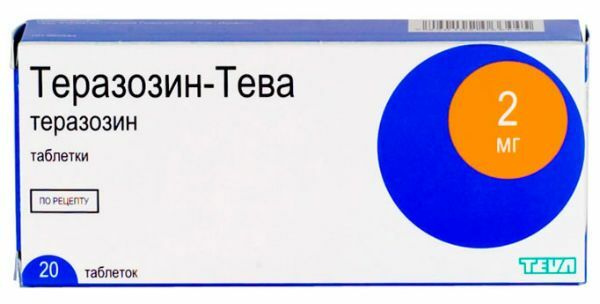
Produced in the form of tablets;active substance - terazosin hydrochloride dihydrate.
The drug promotes the expansion of venules and arterioles, a reduction in venous return to the myocardium and a general peripheral vascular resistance, also has an antihypertensive effect. It is prescribed for the treatment of arterial hypertension and benign prostatic hyperplasia.
Therapy should be started with a minimum dose of 1 milligram, take it before bed and afterwards stay in bed for 5-6 hours. Increase in the dose occurs gradually 1 time in 7-10 days. The maintenance dose, depending on the effectiveness of therapy and indications, is 1-10 milligrams 1 time per day. The maximum daily dose is 20 milligrams.
Side effects: asthenia, dizziness, drowsiness, fainting, nausea, palpitations, tachycardia, nasal congestion, peripheral edema, visual impairment, rarely - impotence.
Tamsulosin( Omnik, Fokusin, Omsulosin, Proflosin)
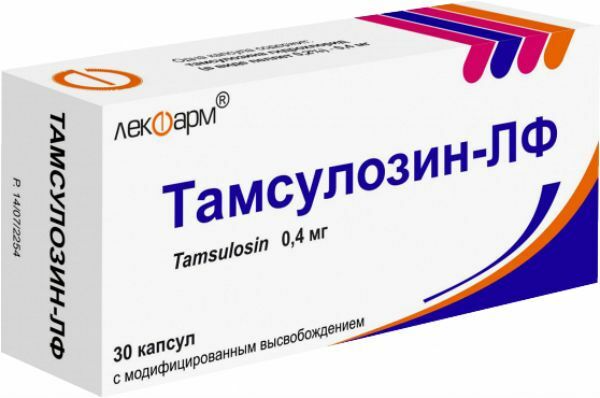
Available in the form of capsules and granules;The active ingredient is tamsulosin hydrochloride.
The drug reduces the tone of the smooth muscles of the neck of the bladder, prostate and prostatic part of the urethra, improving the outflow of urine. Simultaneously reduces the symptoms of irritation and obstruction caused by benign prostatic hyperplasia.
For treatment appoint 0.4 milligrams per day after breakfast, squeezed large amounts of liquid.
Side effects: asthenia, headache, increased heart rate, dizziness, rarely - retrograde ejaculation, decreased libido, constipation, diarrhea, rhinitis.
Urupidil Carino( Ebrantil, Tahiben)
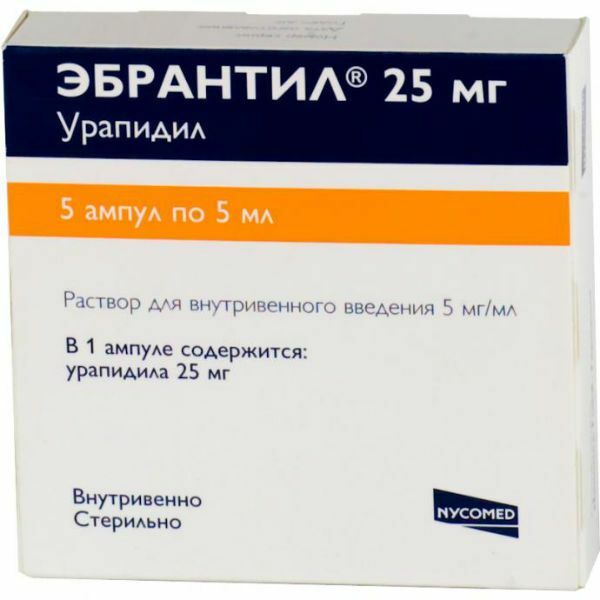
Available in the form of a solution;active substance - urapidil hydrochloride.
Has hypotensive effect( lowers arterial pressure), reduces peripheral resistance of blood vessels. The drug is prescribed for hypertensive crisis and hypertension.
The agent is administered intravenously. In severe and acute forms of pathology, 25 milligrams are administered for 5 minutes. If the desired result was not achieved, after 2 minutes the dose is repeated, in case of ineffectiveness of the repeated dose, after 2 minutes pass to a slow intravenous injection of 50 milligrams. Then go to a slow drop infusion.
Side effects: headache, dry mouth, thrombocytopenia, allergic reactions, phenomena of orthostatic collapse.
Udorek
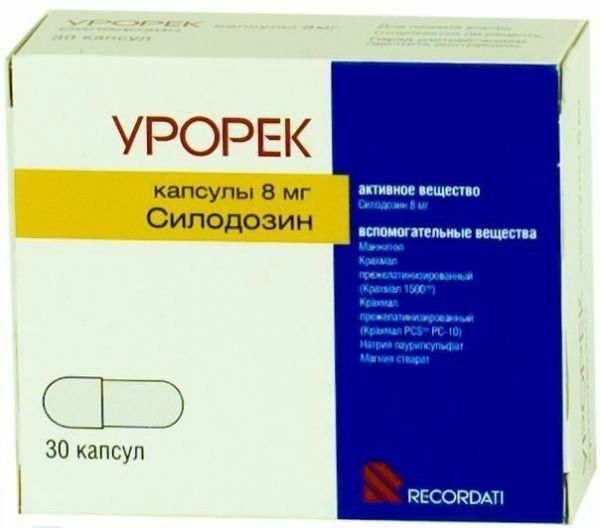
Available in the form of capsules;active ingredient is silodosin.
Indicated for the treatment of urinary disorders caused by benign prostatic hyperplasia.
The recommended initial dose is 8 milligrams 1 time per day, at the same time as food( preferably at the same time of day).Patients with renal failure for 7 days should take the drug at a dose of 4 milligrams per day, with good tolerability dose can be increased to 8 milligrams.
Side effects: dizziness, orthostatic hypotension, diarrhea, nasal congestion, decreased libido, nausea, dryness in the oral cavity.
Alpha-2-adrenoblockers( non-selective)
Increase the pressure by stimulating the adrenoreceptors of the hypothalamic-pituitary system.
to contents ^Dopegit( Methyldopa, Dopanol)
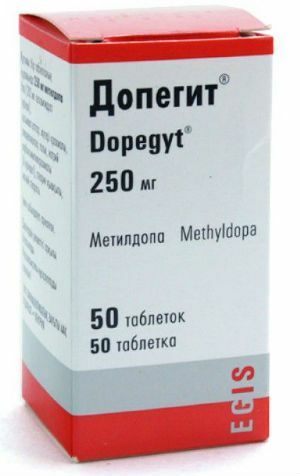
Produced in the form of tablets;The active ingredient is methyldopa sesquihydrate.
A hypotensive drug that lowers heart rate and reduces overall peripheral vascular resistance. It is used for the treatment of mild and moderate arterial hypertension( including arterial hypertension in pregnancy).
In the first 2 days, the drug is recommended to take 250 milligrams in the evening, then in the following 2 days the dose is increased by 250 milligrams and so on until a therapeutic effect is achieved( usually occurs when a daily dose of 1 gram is divided into2-3 reception).The maximum daily dose can not be more than 2 grams.
Side effects: drowsiness, paresthesia, lethargy, staggering when walking, dry mouth, mialgia, arthralgia, decreased libido( potency), fever, pancreatitis, leukopenia, nasal congestion and others.
Clonidine( Catapressan, Clofelin, Barklid, Chlofazoline)
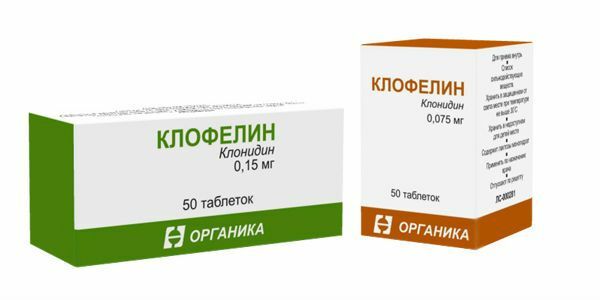
Produced in the form of tablets, solution and eye drops;active ingredient is clonidine hydrochloride.
Clonidine is an antihypertensive drug of central action. Indications for use are: arterial hypertension, hypertensive crisis, primary open-type glaucoma as a monotherapy or in combination with other medications that reduce intraocular pressure.
The doctor sets the dosage individually. The recommended initial dose is 0,075 mg three times a day. Then the dose can be gradually increased to 0.9 milligrams. The maximum daily dose should not exceed 2.4 milligrams. Elderly patients are prescribed 0,0375 mg three times a day. The average course duration is 1-2 months. To stop the hypertensive crisis, the drug is administered intramuscularly or intravenously at a dose of 0.15 milligrams.
Side effects: drowsiness, anxiety, asthenia, sedation, night restlessness, bradycardia, itching, rashes on the skin, dry conjunctiva, burning or itching in the eyes, swelling and congestion hyperemia.
Alpha-1,2-adrenoblockers
to table of contents ^Dihydroergotamine( Ditamin, Clavigrenin, DG-Ergotamine)
Is available in the form of a solution;active ingredient is dihydroergotamine.
Reduces the tone of the arteries, has a direct tonic effect on the peripheral veins. It is prescribed for migraine, varicose veins of lower extremities, orthostatic hypotension, vegetative lability, intestinal atony.
The drug is administered intramuscularly and intravenously, and is also administered internally( intermittent treatment).Intramuscularly for arresting the attack, the recommended dose is 1-3 milligrams, for a more rapid achievement of the effect, intravenously 1 milligram is administered. Inside for the removal of migraines prescribe 2.5 milligrams 2-3 times a day for several weeks. With varicose expansion - 15 milligrams per day three times a day.
Side effects: dizziness, vomiting, diarrhea, arrhythmia, drowsiness, rhinitis, fingers and feet paresthesias, pains in the extremities, tachycardia, cardialgia, vasospasm, nasal congestion.
Dihydroergotoxin( Hydergin, DG-Ergotoksin)
Is available in the form of a solution for injection and oral administration;active ingredient is dihydroergotoxin.
Antiadrenergic drug, lowering blood pressure and dilating the blood vessels, blocker of alpha and alfazadrenoreceptors. Indications for use: hypertension, endarteritis( disease of the inner shell of the arteries), migraine, Raynaud's disease, retinal vasospasm.
With hypertension and peripheral circulation disorder, the alpha-adrenoblocker is prescribed 5 drops orally three times a day, then the dose is increased 2-3 drops to 25-40 drops 3 times a day. In severe disorders of peripheral circulation, intramuscular or intravenous injection of 1-2 milliliters is administered.
Side effects: allergic reaction, indigestion.
Sermion( Nicergoline, Nicergoline-Ferein)
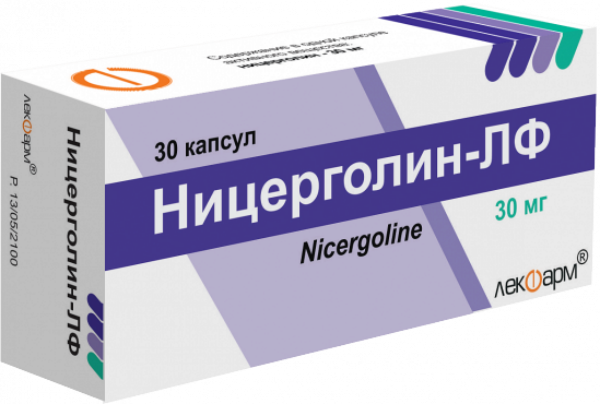
Produced in the form of tablets;the active substance is nicergoline.
Alfa1,2-adrenoblokator improves peripheral and cerebral circulation. Indications: chronic and acute cerebral vascular and metabolic disorders( due to arterial hypertension, atherosclerosis and so on);chronic and acute vascular and peripheral metabolic disorders( Raynaud's disease, arteriopathy of the extremities).
The drug is prescribed by mouth depending on the disease and its severity 5-10 milligrams three times a day or 30 milligrams twice a day, at regular intervals, for a long time.
Side effects: decreased blood pressure, headache, insomnia or drowsiness, confusion, diarrhea, dyspeptic phenomena, skin rash.
Beta-1-adrenoblockers( selective, cardioselective)
Beta-1 receptors are mainly concentrated in the myocardium, and when they are blocked, a decrease in the heart rate is observed.
to table of contents ^Bisoprolol( Concor, Concor Cor, Coronale, Niperten)
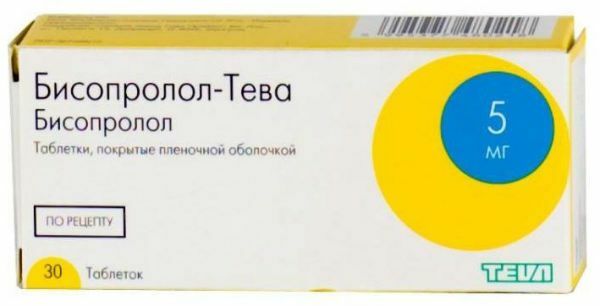
Produced in the form of tablets;active substance - bisoprolol fumarate.
The drug has antiarrhythmic, antihypertensive and antianginal action. The medicine reduces the need of the heart in oxygen, reduces the pulse rate( with exercise and rest) and cardiac output. Indication: prevention of angina attacks, arterial hypertension, chronic heart failure.
The dosage regimen is determined by the physician individually. The average dose is 0.005-0.01 grams. The medicine must be taken 1 time a day in the morning during or before breakfast.
Side effects: dizziness, cold feeling, sleep disorders, bradycardia, conjunctivitis, nausea, diarrhea, abdominal pain, muscle weakness, cramps, rashes on the skin, hot flashes, a violation of potency.
Breviblok
Available in the form of a solution;active ingredient is esmolol hydrochloride.
Selective beta-1-blocker is indicated for supraventricular tachyarrhythmia( including flutter and atrial fibrillation) and hypertension after and during surgery.
The agent is administered intravenously, the dose is selected individually and adjusted depending on the clinical outcome.
Side effects: marked decrease in blood pressure, bradycardia, asystole, sweating, dizziness, confusion, bronchospasm, shortness of breath, difficulty breathing, nausea, urinary retention, visual and speech impairment, edema and others.
Metoprolol( Egiloc, Betaloc, Metocard, Metoprolol Retard-Acrychin)
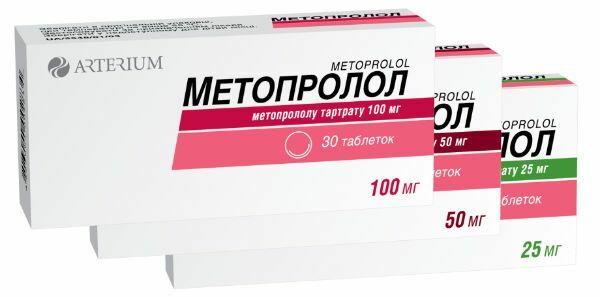
Produced in the form of tablets;active substance - metoprolol tartrate.
The modern selective beta-blocker is used for arterial hypertension( including hyperkinetic-type tachycardia), ischemic heart disease( secondary prevention of myocardial infarction, angina attacks), cardiac rhythm disturbance, hyperthyroidism( in complex therapy), migraine.
Tablets should be taken with food or immediately after meals, swallowing whole. Depending on the pathology and its severity, the daily dose can be from 50 to 200 milligrams.
Side effects: fatigue, paresthesia of the limbs, headache, sinus bradycardia, lowering of blood pressure, anxiety, allergic reaction( rash, skin itching, skin hyperemia), abdominal pain, palpitations, nasal congestion and others.
Beta-1,2-adrenoblockers( nonselective)
Drugs regulate blood pressure and affect cardiac conduction.
to table of contents ^Anaprilin( Obsidan)
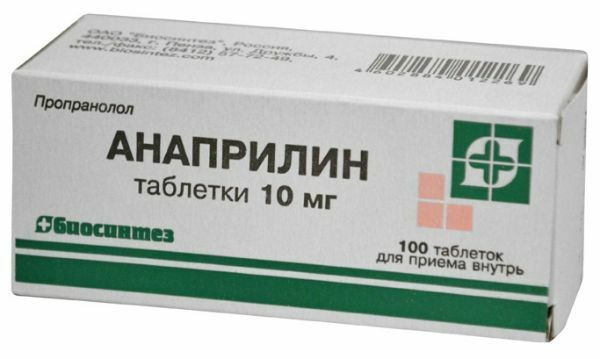
Produced in tablets;active ingredient is propranolol hydrochloride. A non-selective beta-blocker is indicated for hypertension, unstable angina, sinus tachycardia, tachysystolic atrial fibrillation, supraventricular tachycardia, ventricular and supraventricular extrasystole, anxiety, and essential tremor.
Tablets are consumed inside regardless of food. At the beginning of treatment, they prescribe 20 mg per day, then the doctor can increase the dosage.
Side effects: soreness and dry eyes, fatigue, depression, nervousness, sinus bradycardia, thrombocytopenia, bronchospasm, increased sweating and so on.
Bopindolol( Sandonorm)
Produced in the form of tablets;the active substance is bopindolol.
A non-selective beta-blocker that exerts antihypertensive and anti-anginal action. It is used for arterial hypertension, angina pectoris, arrhythmia, myocardial infarction( secondary prevention).
The drug is prescribed in the initial dosage - 1 milligram per day, according to the indications the dose can be increased to 2 milligrams per day, and when the desired effect is reduced to 0.5 milligrams per day.
Side effects: bradycardia, decreased blood pressure, sleep disturbance, cold feeling, bronchospasm, dyspnea, fatigue, weakness, vomiting, nausea, constipation, flatulence, dryness in the mouth, dizziness.
Nadolol( Soldol, Betadol)
Produced in the form of tablets;active ingredient - nadolol.
The drug has anti-ischemic( antianginal) activity and is used to treat ischemic myocardial disease. It is also effective in hypertension( persistent elevated blood pressure).In addition, the drug is indicated for the treatment of migraine, tachyarrhythmia( violation of the heart rate) and to eliminate the symptoms of hyperthyroidism( increased thyroid function).
Prescribe the tablets inside regardless of food. With IHD, the medication is started from 40 milligrams 1 time per day, after 4-7 days the dose is raised to 80-160 milligrams per day. When hypertension is prescribed for 40-80 milligrams 1 time per day, slowly increase the dose to 240 milligrams( in 1-2 admission).For therapy, tachyarrhythmias begin at 40 milligrams per day, then increase to 160 milligrams per day.
Side effects: insomnia, fatigue, paresthesia( sensation of numbness in the limbs), bradycardia, dry mouth, gastrointestinal disorders.
Oxprenolol( Trazicore)
Produced in the form of tablets;active ingredient is oxprenolol.
Has antianginal, antihypertensive and antiarrhythmic effect. It is indicated for arterial hypertension, myocardial infarction( secondary prophylaxis), atrial fibrillation, disturbance of the heart rhythm. Also, the drug is used as an additional treatment for mitral valve prolapse, pheochromocytoma, tremor.
It is recommended to start taking the medication from 20 milligrams 4 times a day, gradually increasing the dose to 40-80 milligrams 3-4 times a day. The maximum daily dose should not exceed 480 milligrams. For secondary prevention after a heart attack, 40 milligrams are prescribed twice a day.
Side effects: weakness, drowsiness, dizziness, depression, anxiety, weakening of heart muscle contractility, chest pain, blurred vision, and others.
Alpha-beta blockers
Drugs in this group lower blood pressure and OPSS( general peripheral vascular resistance), and also reduce intraocular pressure in open-angle glaucoma.
to table of contents ^Carvedilol( Dilatrend, Carvedilol Sandoz, Carvedilol Zentiva, Vedicardol)
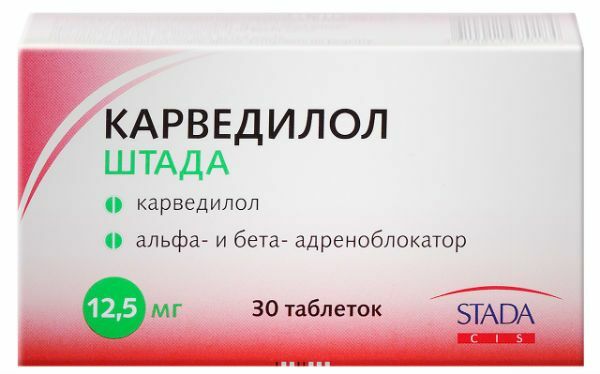
Is available in the form of tablets;active ingredient is carvedilol.
Has vasodilator, antihypertensive and antianginal effect. The drug reduces blood pressure, post- and preload on the myocardium, moderately reduces heart rate, without affecting the renal blood flow and kidney function. Used in the form of monotherapy and in combination with other antihypertensive drugs for the therapy of arterial hypertension, stable angina, chronic heart failure.
The drug is consumed inside, regardless of food. The dose is determined by the doctor individually depending on the disease and the clinical response. At the beginning of treatment, the dose is 12.5 milligrams, after 1-2 weeks it can be increased to 25 milligrams. The maximum daily dose is 50 milligrams.
Side effects: bradycardia, headache, depression, diarrhea, vomiting, swelling, renal dysfunction, leukopenia, nasal congestion, shortness of breath, bronchospasm and so on.
Proxodolol
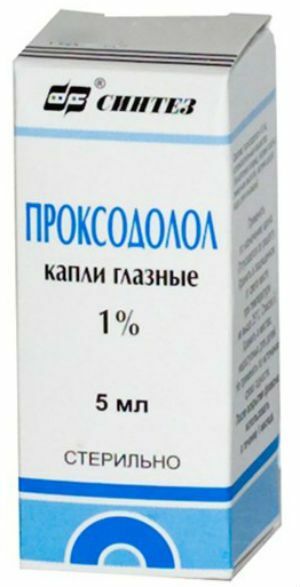
Available in the form of drops for eyes;active ingredient is proxodolol. Antiglaucoma is used to treat increased intraocular pressure, aphakic glaucoma, open-angle glaucoma and other secondary glaucoma. It is also used in complex therapy to reduce intraocular pressure in closed-angle glaucoma.
The medicine must be instilled in the conjunctival sac 1 drop up to 3 times a day.
Side effects: blurred vision, dry mouth, bradycardia, gastralgia, headache, decreased blood pressure, the appearance of bronchospasm.
Pregnancy
It is not recommended to take adrenoblockers during pregnancy. However, if there is an urgent need, then appoint and monitor its reception, only specialists can select replacements.
In the lactation period, adrenoblockers are not prescribed, instead the doctor recommends a special diet and physical activity. It is possible to use medical products with high content of potassium, minerals, magnesium and calcium.
Children
Adrenoblockers at the age of 16-18years. In rare cases and on the prescription of a doctor, drugs are used to treat children younger than the specified age.
